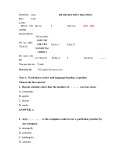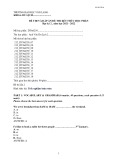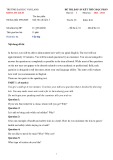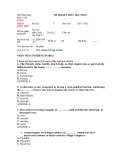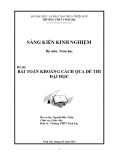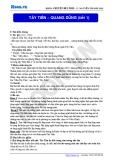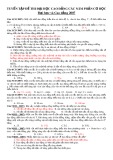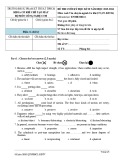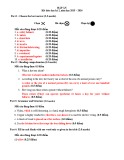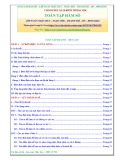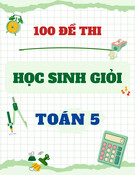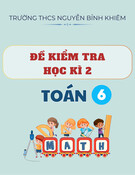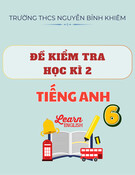ÑEÀ SOÁ 21 TRÖÔØNG CAO ÑAÚNG COÄNG ÑOÀNG TRAØ VINH – NAÊM 2004 Moân: Tieáng Anh – Khoái D (Thôøi gian laøm baøi: 180 phuùt)
Caâu 1: Choïn moät töø/ nhoùm töø thích hôïp cho moãi choã troáng trong caùc caâu sau. (2,0 ñieåm) 1.
D. would
B. go on D. go by C. go out I will see him when he . . . . . . . . . . . . . next week. A. will arrive C. arrived B. arrives arrive If you . . . . . . . . . . . . . drinking so much, you will get a stomachache. A. go over
B. left C. will leave A. so that he bought a computer B. so that to buy a computer C. so that he could buy a computer D. in order he buys a computer It’s high time we . . . . . . . . . . . . . A. are leaving D. were left
B. is there A. isn’t there C. is anyone D. isn’t
B. otherwise
I will play tennis tomorrow . . . . . . . . . . . . . it rains A. except D. but C. unless . . . . . . . . . . . . . the students here enjoy taking part in social activities. D. The A. Most of C. Much of B. Most
“Is the . . . . . . . . . . . . . ?” – “No, its black” A. big brown dog C. brown dog big B. brown a big dog D. big dog brown
B. kept A. take C. lost D. put
A. be used for C. used to B. be used to D. use
C. to driving A. to drive B. drive D. driving
2. 3. Tom saved money . . . . . . . . . . . . . 4. 5. There is no one in the house . . . . . . . . . . . . . ? anyone 6. 7. number of 8. 9. My sister went to Canada in 2000. I have . . . . . . . . . . . . . touch with her. 10. Wood can . . . . . . . . . . . . . making paper. 11. She will never get used . . . . . . . . . . . . . on the left 12. Last week, Dick . . . . . . . . . . . . . his right leg
A. feels and breaks C. fell and broke B. felt and broke D. fallen and broken
D. as B. for C. while A. during
A. much than C. as much as
A. is B. are D. take
C. apply A. enjoy B. require D. whisper
A. serious C. confident D. reliable
C. passes D. writes B. buys A. looks
C. written B. timber D. river A. climb
B. washed C. wanted D. regarded A. swallowed
13. She was unhappy . . . . . . . . . . . . . her childhood 14. He was only nine, but he ate . . . . . . . . . . . . . his father did B. more than that D. so much as 15. Six miles . . . . . . . . . . . . . a long distance to walk C. have 16. Which of the following words is stressed on the first syllable? 17. Which of the following words is stressed on the second syllable? B. terrible 18. Which of the following words contains the final sound /z/? 19. Which underlined part is pronounced differently from the others? 20. Which of the following words has the ending /t/? Caâu 2: Dieàn vaøo choã troáng baèng daïng ñuùng cuûa töø trong ngoaëc (1,5 ñieåm) 21. He is a very . . . . . . . . . . . . . carpenter (skill) 22. She is singing . . . . . . . . . . . . . (beauty) 23. Her father . . . . . . . . . . . . . her to apply for the job (courage) 24. Please . . . . . . . . . . . . . the relevant authorities at once (information) 25. Half of the . . . . . . . . . . . . . in this school come from Can Tho (lecture) 26. There has been a . . . . . . . . . . . . . of 10% in the amount of money available
for buying new books (reduce)
“Hello, what’s the (27) . . . . . . . . . . . . . ? You do look miserable!” said Mrs.
Caâu 3: Tìm moät töø thích hôïp ñeå ñieàn vaøo moãi choã troáng ñöôïc ñaùnh soá trong ñoïan vaên sau (2,0 ñieåm) Mrs. Bailey and her little daughter, Julie, were coming back home from shopping when they saw their neighbour, Mrs. Perkins, standing outside her front door looking very upset. Bailey. “I have done a silly thing. I have locked myself (28) . . . . . . . . . . . . .” said Mrs. Perkins. “I don’t know what to do. If only I weren’t so fat, I would be (29) . . . . . . . . . . . . . to get in through the window. That small window at the side of my house isn’t fastened.”
“Thank you very much for you (36) . . . . . . . . . . . . . , Julie. Here is twenty
……………………………………………………………………………………………………………………………… ………………………………………………………………………………………………………………………………
………………………………………………………………………………………………………………………………… …………………………………………………………………………………………………………………………………
Mrs. Bailey thought a moment and then asked Julie (30) . . . . . . . . . . . . . climb through the window. Mrs. Perkins wondered if Julie would be tall (31) . . . . . . . . . . . . . to reach the door handle when she got in. Julie said she would try. So, the two ladies helped the (32) . . . . . . . . . . . . to climb in over the window-sill. They were very pleased (33) . . . . . . . . . . . . . they heard Julie behind the door. She managed to reach up, turn the door handle and release the lock. Mrs. Perkins pushed the door wide (34) . . . . . . . . . . . . . and with a feeling of relief stepped into (35) . . . . . . . . . . . . . own home. pence for you to spend.” Caâu 4: Ñoïc ñoïan vaên döôùi ñaây vaø traû lôøo caùc caâu hoûi sau (2,0 ñieåm) English has for more than a century and a half been called a word language. The number of people who speak it as their mother tongue has been estimated at between three hundred million and four hundred million. It is recognized as an official language in countries where 1.5 billion people live. China, the importance attached to learning English is such that a televised teaching course drew audiences of up to 100 million. But this spread of English throughout the word is relatively recent. In the late sixteenth century, English was spoken by just under 5 million people. The arrival of English in North America was the key step its world- wide expansion. The United States is a huge commercial market and this has tended to promote the English language in many other nations. About eighty percent of the data stored on the world’s computers are believed to be in English and nowadays insufficient knowledge of English can be a problem in business. 37. How long has English been called an international language? - - 38. What mainly helped spread English throughout language? - - 39. How many people speak English as their first language? - …………………………………………………………………………………………………………………………………… - …………………………………………………………………………………………………………………………………… 40. What has tended to promote the English language in many other nations? - ……………………………………………………………………………………………………………………………………… - ……………………………………………………………………………………………………………………………………… Caâu 5: Vieát laïi caùc caâu sau sao cho nghóa cuûa chuùng khoâng thay ñoåi. Moãi caâu vieât laïi ñöôïc baét ñaàu baèng nhöõng töø cho saün. (1,5 ñieåm)
In spite ……………………………………………………………………………………………………………………………
They are such ………………………………………………………………………………………………………………
The ball ……………………………………………………………………………………………………………………………
Barbara wanted to know …………………………………………………………………………………………… It is not a habit of mine to sleep in the afternoon I’m not ………………………………………………………………………………………………………………………………
…………………………………………………………………………………………………………………………………………………
…………………………………………………………………………………………………………………………………………………
………………………………………………………………………………………………………………………………………………… It/ take/ him/ six years/ master English. ………………………………………………………………………………………………………………………………………………… 41. Although Bill took a taxi, he still arrived late. - 42. The stamps are so beautiful that all of us want to buy them. - 43. The boy threw the ball through the window. - 44. Barbara asked me: “Why do you leave without saying goodbye?” - 45. - 46. Nam has difficult in studying physics - It is ……………………………………………………………………………………………………………………………………… Caâu 6: Söû duïng caùc töø gôïi yù sau ñeå vieát thaønh nhöõng caâu hoøan chænh. Anh(chò) co theå them töø vaø thöïc hieän nhöõng bieán ñoåi caàn thieát nhöng khoâng boû baát kyø töø naøo (1,0 ñieåm) 47. Dick/ listening/ classical music/ when/ friend/ arrived. - 48. They/ warn/ us/ not/ sleep/ without/ mosquito nets. - 49. My father/ look/ forward/ hear about/ results/ my exams. - 50. -
2B 12C 1B 11C 4B 14C 8D 18B 3C 13A 5B 15A 6C 16D 7A 17D 9C 19A 10A 20B
21. skilled/ skillful/ skilful 23. encourages/ encouraged 25. lecturers 22. beautifully 24. inform 26. reduction
31. enough 34. open
28. out (outside: 0,1 ñieåm) 30. to 33. when/ as 36. help/ assistance 27. matter/ problem 29. able 32. girl/ child 35. her
ÑAÙP AÙN TRÖÔØNG CAO ÑAÚNG COÄNG ÑOÀNG TRAØ VINH – NAÊM 2004 Caâu 1: (2 ñieåm – moãi caâu ñuùng ñöôïc 0,1 ñieåm) Caâu 2: (1,5 ñieåm - moãi töø ñuùng ñöôïc 0,25 ñieåm) Caâu 3: (2 ñieåm - moãi töø ñuùng ñöôïc 0,2 ñieåm)
37. For more than a century and a half. (Or: English has for more than a century
38. The arrival of English in North America helped spread English throughout
39. Between three hundred million and four hundred million people (speak
41. In spite of taking a taxi, Bill still arrived late 42. They are such beautiful stamps that all of us want to buy them 43. The ball was thrown through the window by the boy 44. Barbara wanted to know why I left school without saying goodbye 45. I’m not used to/ accustomed to sleeping in the afternoon 46. It’s difficult for Nam to study physics
47. Dick was listening to classical music when his friend arrived 48. They warned us not to sleep without mosquito nets 49. My father looks forward/ is looking forward to hearing about the results of
50. It took/ will take him six years to master English
Caâu 4: (2 ñieåm - moãi caâu traû lôøiø ñuùng ñöôïc 0,5 ñieåm) and a half been called a world/ an international language) the world. (Or: The arrival of English in North America was the key step in its worldwide expansion.) English as their first language) 40. The United States is a huge commercial market and this has tended to promote the English language in many other nations. (Or: The huge commercial market of the United States has) Caâu 5: (1,5 ñieåm - moãi caâu ñuùng ñöôïc 0,25 ñieåm) Caâu 6: (1 ñieåm - moãi caâu ñuùng ñöôïc 0,25 ñieåm) my exams


